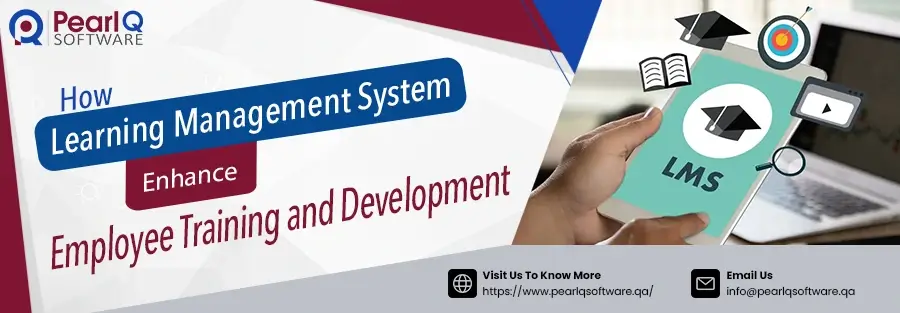
In today’s fast-paced business world, organizations are constantly seeking ways to improve employee training and development. A Learning Management System (LMS) is a powerful solution that can streamline, personalize, and enhance the way employees learn and grow within their roles.
In this blog, we’ll explore the key benefits of using an LMS for employee training and development.
What is a Learning Management System (LMS)?
A Learning Management System (LMS) is a software application that helps organizations manage, deliver, and track educational content, training programs, and eLearning courses. It provides tools for online learning, including course creation, assessments, and reporting.
Why is LMS Important for Employee Training?
A Learning Management System (LMS) has become an essential tool for modern employee training and development. As businesses recognize the need for continuous learning, an LMS provides a streamlined, automated, and effective way to meet the diverse learning needs of employees, making it an invaluable tool for Human Resources (HR) and Learning and Development (L&D) professionals.
Get started with a FREE account on our LMS. You can explore and see how easy it is to scale, track, and manage employees.
Key Benefits of Using a Learning Management System (LMS) for Employee Training
1. Accessibility and Flexibility
One of the primary advantages of a Learning Management System (LMS) is the ability to offer flexible training. Employees can access training materials anytime, anywhere, making it easy for them to learn at their own pace. Whether they are in the office, working remotely, or on the go, Learning Management System (LMS) platforms provide instant access to learning modules, webinars, eLearning courses, and resources. This flexibility is especially important for businesses with remote or hybrid teams.
2. Cost-Effectiveness
Traditional in-person training sessions can be expensive and time-consuming. With an LMS, you can reduce costs related to travel, venue bookings, and printing materials. Furthermore, the scalability of an LMS allows organizations to train large numbers of employees at once without significant added costs. Courses can be reused and updated, making it a cost-effective solution in the long run.
3. Personalized Learning Experience
Learning Management System (LMS) platforms offer personalized learning experiences that allow employees to progress at their own pace, revisit content as needed, and focus on areas for improvement. Personalization is crucial for employee engagement and retention, as it ensures learners receive training tailored to their specific roles and career goals.
4. Enhanced Tracking and Reporting
A Learning Management System (LMS) provides organizations with detailed analytics and reports on employee progress, course completion rates, and skill development. This data helps managers identify knowledge gaps, measure learning outcomes, and determine the effectiveness of training programs. Using real-time data, you can make informed decisions on future training initiatives, ensuring that your employees continue to grow and excel.
5. Consistent and Standardized Training
Ensuring all employees receive consistent, high-quality training is crucial for maintaining uniformity across your organization. The LMS platform enables you to standardize training programs, ensuring that every employee learns the same core concepts and skills. This consistency helps prevent knowledge gaps between departments or teams.
Get started with a FREE account on our LMS. You can explore and see how easy it is to scale, track, and manage employees.
How to Choose the Right LMS for Your Organization
When selecting a Learning Management System (LMS) for your organization, it’s essential to consider several factors to ensure it aligns with your training goals and employee needs. Let’s explore:
1. Ease of Use
Our LMS is designed with ease of use in mind. It offers a clean, intuitive interface that requires minimal training to navigate. Whether you are an administrator setting up a course or an employee engaging in a learning module, our LMS platform ensures smooth, seamless interactions with no technical barriers.
2. Customization Options
We understand that every organization has unique training requirements. Our LMS allows you to customize the platform to fit your specific needs—from company branding and logos to custom course structures and industry-specific content. Personalizing your LMS ensures that training feels cohesive and aligned with your organizational culture.
3. Integration Capabilities
Our LMS integrates effortlessly with your existing HR systems, CRM, performance management tools, and other business applications. By ensuring smooth data flow between platforms, you can eliminate the silos and manual workarounds, resulting in improved efficiency and data-driven insights.
4. Scalability
Whether you’re a start-up or a multinational company, our LMS is designed to scale with you. As your team grows and your learning programs evolve, our platform can easily handle the increased demand—whether it’s onboarding hundreds of new employees, expanding your training catalog, or adding new features. No matter how large your organization becomes, your learning management needs will always be met.
5. Mobile Compatibility
Our mobile-responsive LMS ensures that employees can access learning content anytime, anywhere, on any device. Whether they are in the office, at home, or on the move, learners can engage with the content at their convenience, helping to promote a culture of continuous learning.
6. Certification and Reporting
Effortlessly track learner progress with our comprehensive reporting tools. Issue certificates upon course completion to motivate employees and provide tangible proof of their achievements. Our LMS offers in-depth analytics to monitor progress, evaluate performance, and ensure compliance—providing managers and administrators with the insights needed to make informed decisions.
7. Support and Resources
Our customer support team is available 24/7, ready to assist you with technical issues, troubleshooting, and guidance. We also provide comprehensive user guides, video tutorials, and training sessions to ensure that you and your employees can get the most out of the LMS platform.
Get started with a FREE account on our LMS. You can explore and see how easy it is to scale, track, and manage employees.
Summary
A Learning Management System (LMS) enhances employee training by providing flexibility, cost-efficiency, personalized learning experiences, and enhanced tracking. It allows organizations to scale training efforts, ensuring consistent quality across the workforce.
Frequently Asked Questions (FAQs)
01. What types of content can I upload to a Learning Management System (LMS)?
A. An LMS supports a wide range of content types, including:
- Text-based lessons and course materials
- Video tutorials and recorded webinars
- Interactive elements like quizzes and assignments
- Infographics and visual aids
- PDFs and documents are provided as downloadable resources
- Elearning courses such as SCORM and Tin Can API (xAPI) and more.
02. Can a Learning Management System (LMS) be used for both training and education?
Yes, Our LMS is versatile and can be used for training in the corporate world as well as for education in schools and universities. It can be adapted to deliver a variety of learning materials, from professional certifications to academic courses.
03. How does a Learning Management System work?
An LMS works by hosting and delivering educational content online. It allows instructors to create and organize courses, manage learners, track progress, and generate reports. Users can access courses anytime, anywhere, enhancing flexibility in learning.
04. What are the benefits of using a Learning Management System (LMS)?
A. Using an LMS provides benefits such as:
- Centralized learning: All materials in one place.
- Scalability: Easily supports a growing number of learners.
- Accessibility: Learners can access content from anywhere.
- Analytics and reporting: Track learner progress and performance.
- Cost-effective: Reduces the need for in-person training.
05. What types of organizations use a Learning Management System (LMS)
A. Organizations of all sizes and industries use LMS platforms, including:
- Corporates for employee training
- Schools and universities for education
- Non-profit organizations for community-based awareness
06. Is a Learning Management System (LMS) suitable for eLearning?
Yes, Our LMS is perfect for eLearning as it offers a platform to host, manage, and deliver online courses. Learners can access content at their convenience, while instructors can monitor progress and provide feedback.
07. Can I track learner progress in a Learning Management System (LMS)?
Yes, Our LMS platforms offer powerful tracking and reporting tools that let you monitor learner progress, completion rates, assessment scores, and engagement. This helps ensure learners are progressing as expected and allows for timely intervention if necessary.
08. Is a Learning Management System (LMS) secure for online learning?
Yes, Our LMS platforms are designed with security features such as data encryption, secure login protocols, and user access controls to protect sensitive information. Always choose an LMS that complies with industry standards for data privacy and security.


